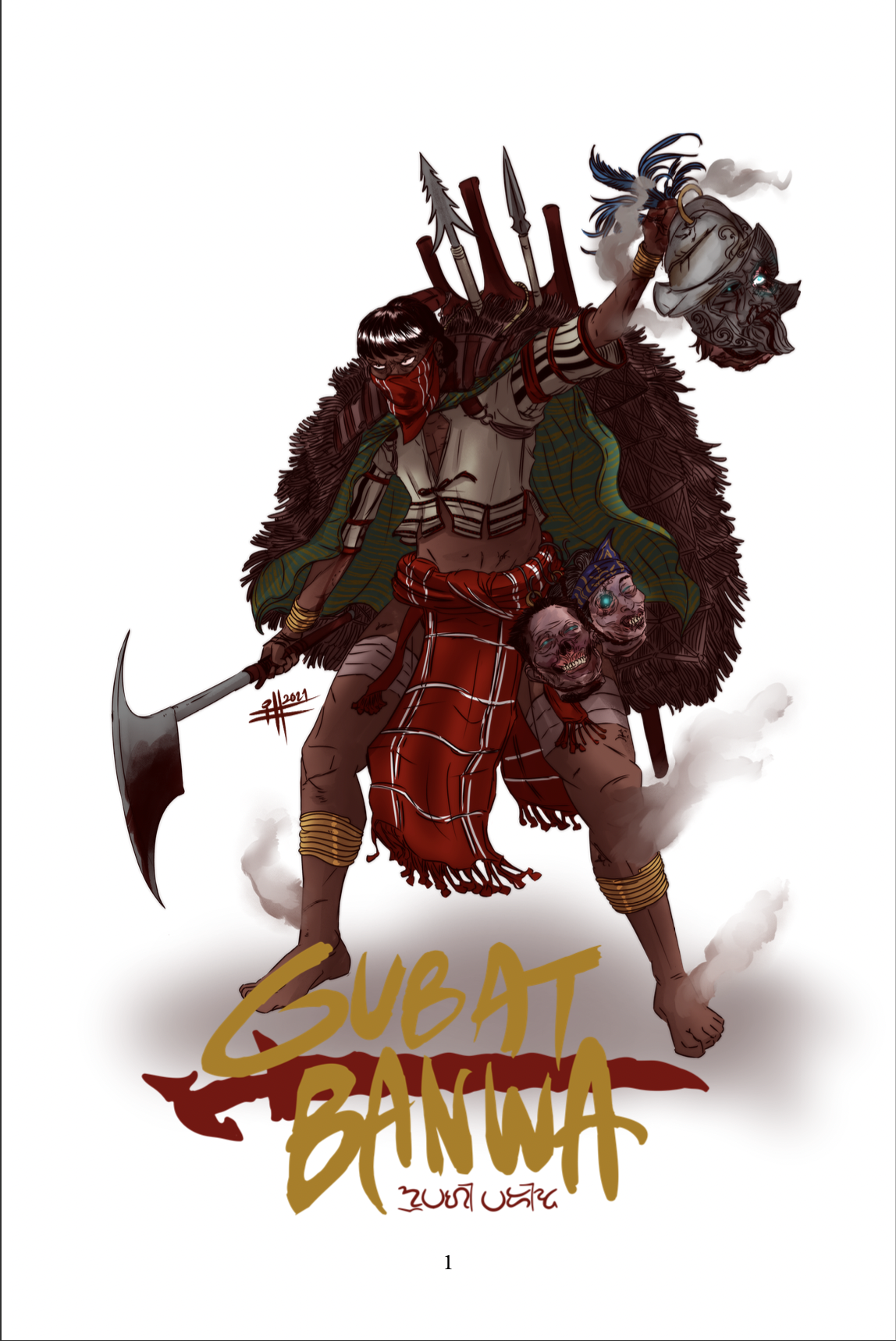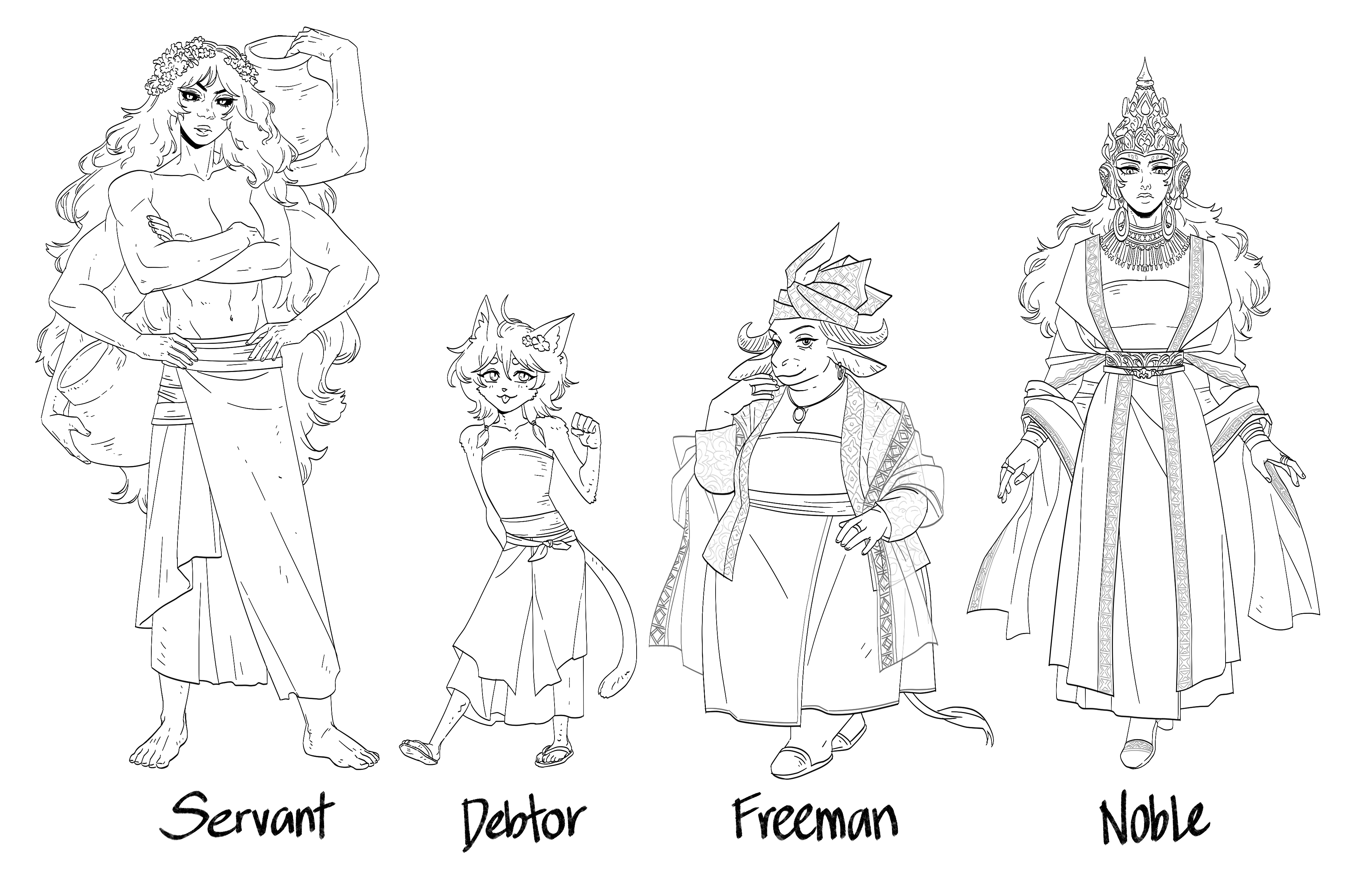GUBAT BANWA 1.4 - 「 Conviction and Destiny」

1.4 Devlog
Ohoy, Kadungganan~
I’ve been actively and relentlessly developing Gubat Banwa for over a year. It’s a wonder that I’ve been able to not lose sight of the initial game design principles.
I said on Twitter that this update might make people mad. That was mostly my anxiety on overhauling the game’s structure. I don’t have to justify myself, but I want to talk about it anyway because I’m horribly excited for this iteration. In my eyes, it’s the version of Gubat Banwa that has been trying to gnaw itself out of the game’s shell since .6, I just needed to run a few more games and get some more feedback before I could solidify it. 1.4 feels less derivative, feels like it’s its own thing, not something I made relying on Lancer’s innovations and D&D4e’s flow (although of course they’re still mega inspirations), which was a major game design hole in my experience and feel. Hopefully, players feel it as well.
First of all, Gubat Banwa gets a subtitle: Warring Nations.
It will not be really shown much but is a way to define things as from the “Core” Rulebook. Warring Nations, which is basically just what Gubat Banwa means in Bisaya. Additionally I’ve revised the introduction.
Secondly, the Mang-Aawit has been changed to The Umalagad.
This tries to not exactly impose but enforce the feel that the Gamemaster is as much a player as the Kadungganan. One dichotomy that I saw is how Kadungganan is a thing in the fiction, while Mang-aawit might not be. So, to strengthen the fiction of this game further, the Mang-aawit is now the Umalagad: the ancestor spirits that permeate the world and influence fate. As the Umalagad, you fate Folk to be entangled in the lives of the Kadungganan, and you introduce violence. When the Kadungganan pray to the umalagad, they ask you for guidance. When you speak with other Umalagad about the game, you are speaking with other ancestor spirits as to how direct fate. In a way, you are in an exalted position, an ancestor spirit, a storyteller.
The Venture/Respite Dichotomy is replaced with Drama/Violence.
The Venture and Respite dichotomy was a design crutch for me, as I wasn’t quite sure what kind of stories could be told through Gubat Banwa. Through the many games I’ve run, I’ve found that having a Venture/Respite is not needed, and in some ways can make pacing or flowing a narrative trickier.
In its place, I’ve adopted a paradigm and structure that is reminiscent of Tactics Ogre or Final Fantasy Tactics: one where the game is split between Combat + Unit Management and War Story.
Outside of combat, you are in “Drama Mode”. In Drama Mode, you gain and spend Conviction Tokens. You gain Conviction Tokens by doing things in the fiction that make things more interesting or more dramatic: betraying people, manipulating others, letting something about you complicate things, choosing to suffer consequences.
You no longer roll outside of Tactical Violence.
You spend Conviction Tokens to move the narrative forward in a direction you want: you spend it to do something extraordinary, to learn something about someone, to introduce a solution to a problem.
However, whenever you spend a Conviction Token, the Umalagad gains a Destiny Token. A Destiny Token can be used to make consequences direr, to complicate things even further, introduce something new, or to prevent the expenditure of a Conviction Token.
This ebb and flow of Conviction and Destiny, like a river of blood, is the life flow of Gubat Banwa’s drama. When you enter into Tactical Violence, you need Conviction Tokens to be able to Bolster your attacks and to perform your Forbidden Technick.
Respite Activities have been turned into Beats, so you can do them whenever it is fictionally appropriate to do so. Kadungganan rise in Prestige, the new term for Level, by gaining 5 Esteem, which you gain 1 automatically after every Session as long as you engage in the drama and violence.
Stats replaced by Traits.
Outside of Violence, you gain 3 Traits, one word descriptors about your Kadungganan. These can be invoked to purposely complicate things for the worse to gain a Conviction Token, or you can invoke it to spend a Conviction Token to do something extraordinary related to the invoked Trait. Traits used in this way are Marked, and cannot be used again until the end of the session. In this way, the characters are placed in the forefront.
Traits can change over the course of a Campaign, as exemplified by the Self Beat known as Change. It must follow the Fiction, of course.
No More Grit.
The entire system is built around the ebb and flow of conviction now. Technicks no longer have Grit augments. I’m sure there’s going to be pushback for this change, but it works well for streamlining flow, and reducing tactical overhead choices. When I was listing down tactical considerations per turn, I realized that there were too many with all the buffs, debuffs, affinities, etc. With Grit on top of that, it only contributed to confusion and artificially lengthened combat time. Balancing around Grit gets really tricky as well, and is something I very quickly grew tired of.
Kadungganan are constantly doing badass shit, we don’t need a mechanic for it. Additionally, I did not want to make describing your actions mechanically prescriptive. When you want to describe an action, I hopefully want it because you’re hyped up on the lore, the fluff, the context, and the mechanics. That stuff comes naturally, and I think the writing in Gubat Banwa is enough for it. Constantly describing actions to be “as cool as possible” also gets tiring, so now you can do it only when you want to, and not in every possible thing to eke out extra points.

No More Violence Rolls.
All the variance in an attack is in the damage roll. You no longer roll to-hit. Instead, you roll to deal damage, with the minimum damage that you can deal being 1 (save for Null and other abilities). This ensures that combat is always moving forward, and tactical positioning is centered around mitigating and capitalizing on damage and range.
This makes sense in the fiction as well: Mettle is explicitly your combat momentum, your ability to stay in the fight, the ebb and flow of violent intent. You always get whittled down as a fight goes on, which reflects the flux of combat.
Additionally there are no more Chattel due to this paradigm. However numbers are scaled down a bit to compensate, and in higher Tiers, lower Tier units are basically Chattel with the damage you can do.
Preparation Phase
When you enter into combat, you go through a Preparation Phase, where you can switch out a Technick, switch into another Discipline that you have a Technick already in, and other things. In the fiction, this might be literal preparation before a battle, or a flashback to when you prepared your items.
Four Scrolls
The game is now split into four scrolls (again) to help justify the 6x9 single column format, so that people don't see the 800 pages and be immediately daunted. The scrolls are the Kadungganan Scroll (Player Guide), Umalagad Scroll (GM Guide), Copperplate (Lore and Worldbuilding), and Warring Nations (A Narrative for running games). The final game will most probably still be a single book however.
#
Developing Gubat Banwa has been intensely exhausting but exhilarating, relentlessly crushing but uplifting. I hope that it becomes something people love, eventually. I don’t even know how this game gets an audience, being so niche in its setting and not being something most people are interested in. Hell, with the structural overhaul, even less people might be interested in the game even at a mechanics level. But then again, swords do not cut due to broadness, but through sharpness.
I wrote Gubat Banwa with the simple premise of: raids in precolonial Philippines weren’t large standing armies, so skirmish tactical games can represent Precolonial PH very well. What if there was a Precolonial Philippine Tactics game in the same vein and weight of Tactics Ogre and Final Fantasy Tactics? I don’t know if I’ve accomplished any of that right now, but I’m comforted in the fact that I’m at least building up to it.
I pray to the ancestors that this game’s mechanics now does the setting justice.
Here’s an excerpt from the introduction to cap us off:
Take my hand, youngling. The stars still swim in your eyes. Take my hand and witness what I have seen…
Look to the sky, grown one: the dragons float like giant serpents unchained by the lie of the earth….
Look now, grand elder: it is you. You. In the midst of it all. Blood circles you like a heretic halo. Flowers blossom in pungent exaltation. Bamboo clang against bronze gongs. Before you is war, behind you is love and conviction.
What will you become, Kadungganan?
We stand upon the precipice of destiny, with blades and bullets of fire and winds ravaging the land. Feel the scars upon my hand, little one, the grooves of the ink upon my bicep, the burning conviction within my heart. The Sword Isles will descend once again into effervescent, blasphemous, sacrosanct violence. O, dear one, who hast found this scroll, this manuscript etched upon the scrolls of the stars: remember that wretched, that exalted phrase: rejoice in the glory of combat.```
Files
Gubat Banwa First Edition [LEGACY]
The Martial Epic Fantasy RPG
| Status | In development |
| Category | Physical game |
| Author | makapatag |
| Genre | Role Playing |
| Tags | Fantasy, filipino, gubat-banwa, Medieval, Multiplayer, Narrative, Tactical, Tabletop role-playing game |
More posts
- [1.7] To Golden Shores!59 days ago
- GB Patch 1 Errata 1 "GLORY IS AN ENDLESSLY RUSHING RIVER"Jan 12, 2024
- Gubat Banwa Patch 1Jan 04, 2024
- Gubat Banwa 1.6 "Sailing Past The Clouds And To The Shores Of Heaven!"Dec 08, 2023
- Gubat Banwa 1.51Nov 04, 2023
- KICKSTARTER AND 1.5!Oct 20, 2023
- [1e] Update 1.42Sep 18, 2023
- Gubat Banwa First Edition (1.41)Aug 10, 2023
- UNTIL GLORY! Gubat Banwa 1e (v1.4)!Aug 03, 2023
- [GB1E] 1.3Mar 23, 2023
![Gubat Banwa First Edition [LEGACY]](https://img.itch.zone/aW1nLzk2NDE3OTUucG5n/original/95xjBW.png)
Leave a comment
Log in with itch.io to leave a comment.